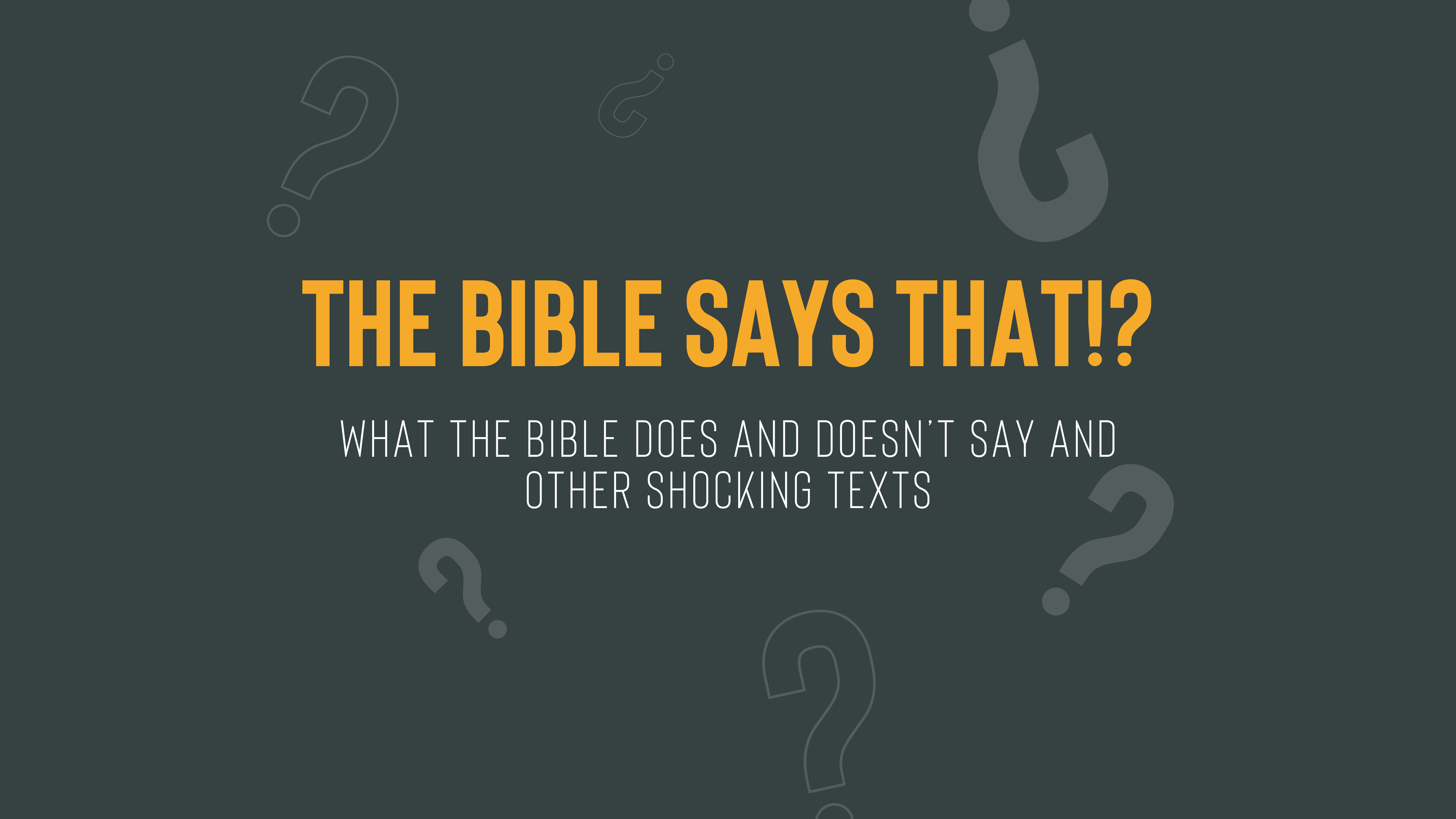The Bible Says That!? - Who Wrote The Torah? Pt. 4

Click Play below to listen as you read along
Remember to click "download" to check out today's handout
Connections with Other Parts of the Bible
Jeremiah and D
D has many similarities with both the narrative and the poetry portions of the Book of Jeremiah. The following is not an exhaustive list.
In the Poetry of Jeremiah, this includes themes and phrases like:
From the smallest to the biggest (Deut. 1:17; Jer. 42:1)
Stubborn and rebellious (Deut. 21:18; Jer. 5:23)
Early rain and late rain in its time (Deut. 11:14; Jer. 5:24)
They left me (Deut. 31:16; Jer. 2:13)
Go after Baal (or: other gods) (Deut. 13:6-10, 31:16; Jer. 2:23, 11:10)
In the narrative of Jeremiah, this includes themes and phrases like:
With all my heart and all my soul (Deut. 4:29; Jer. 32:41)
Brought them out from the land of Egypt, from the iron furnace (Deut. 4:20; Jer. 11:4) On every high hill and under every attractive tree (Deut. 12:2; Jer. 2:20)
Obstinacy of heart (Deut. 9:27; Jer 7:24)
An alien, an orphan, or a widow (Deut. 24:17; Jer. 7:6)
“Your carcass will become food for every bird of the skies and for the animals of the earth, with no one making them afraid. (Deut. 28:26; Jer 7:33)
This shows the distinct nature of the D source in particular as its own source. It’s distinct enough that the author of Jeremiah was made aware of it as its own source and drew from it for its own writing. It is not likely to be a coincidence that these two independent texts are connected in this way.
Ezekiel and P
P has many parallels with the book of Ezekiel. However, this relationship is almost like a warning or a cause in one text, with the result or the punishment in the other. Again, this is not an exhaustive list.
The Blessings by P in Lev. 26 say “if you go by my laws, and if you observe my commandments, and you will do them (26:3) and Curses in 26:14 saying “if you will reject my laws and if your souls will scorn my judgements so as not to do all my commandments. Ezekiel rebukes the people by saying in 5:7 “you did not go by my laws, and you did not do my judgments.”
P’s curse in 26:29 says “You will eat your sons’ flesh.” And in Ezekiel 5:10 it says “fathers will eat sons.”
P warns the people in Lev. 26:22,25 “and I shall let loose the wild animal among you, and it will bereave you…and I shall bring a sword over you… and I shall let an epidemic go among you.” Ezekiel says “I shall let loose hunger and wild animal, and they will bereave you, and epidemic and blood will pass through you, and I shall bring a sword over you. in 5:17
In P, YHWH says to Moses “I shall bring you to the land that I raised my hand to give you to Abraham, to Isaac, and to Jacob, and I shall give it to you in Exod. 6:8. In Ezekiel, YHWH says to Ezekiel “I brought them to the land that I raised my hand to give to them” in Ezek. 20:28.
Hosea and J and E
Hosea cites only J and E when talking about Jacob and Esau. Nothing from the P version of this story makes its way into Hosea. Hosea says in 12:4-5:
“He struggled with the angel and overcame him; he wept and begged for his favor. He found him at Beth-El and talked with him there–the LORD God Almighty, The LORD is his name!”
Hosea is aware of Gen 25:24-26 with the grabbing of the heel, which belongs to J.
Hosea is aware of the wrestling between Isaac and God in Gen 32:25-31, which belongs to E.
Hosea is aware of the reference to Beth-El in J’s version in Gen 28:13-16,19.
In Hosea 9:10, Hosea mentions Israel’s Heresy at “Baal Peor” which is found in J in Numbers 25:1-5. J knows this event as that which took place at “Baal Peor.” Yet P’s version in Num. 25:18 (mentioned twice) and Num 31:16, P calls it “the matter of Peor” rather than mentioning “Baal Peor” thus tying Hosea to E and J.
All of this is to say that other biblical books and authors seem to be aware of specific sources that existed independently. For example, if the story of Jacob and Esau was all a single source, why would Hosea incorrectly call the Israel’s heresy by the wrong name? “the matter of Peor” rather than the incident at “Baal Peor.”
It also appears that later biblical books and their authors were aware of existing independent sources such as J, E, D, and P. Specific causes and effects, as seen through P and Ezekiel giving evidence to this. Similar phrases used word for word over and over and over again suggests the existence of a specific source that Jeremiah was drawing from as the book of Jeremiah was being written. Too many examples for it to be a huge coincidence.
Next week, we’re going to take a look at how each source relates to specific events that happened within the Bible. It's a little different from today in that each source seems to only be aware/ only records specific details about specific regions, characters, events, etc. This ultimately provides evidence that each source came from/lived in a different region or had a different theological/practical purpose for writing what they wrote - thus supporting the existence of multiple authors.
